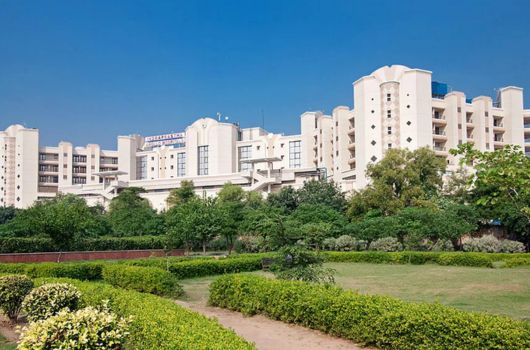
কোভিড-১৯ চিকিৎসা বলতে করোনাভাইরাস (SARS-CoV-2) দ্বারা সৃষ্ট লক্ষণগুলো পরিচালনা এবং উপশম করার জন্য ব্যবহৃত চিকিৎসা সেবা এবং থেরাপি বোঝায়। যদিও অনেক মানুষ বাড়িতে বিশ্রাম এবং সহায়ক যত্নের মাধ্যমে সেরে ওঠে, অন্যদের, বিশেষ করে বয়স্ক প্রাপ্তবয়স্কদের বা যাদের অন্তর্নিহিত স্বাস্থ্য সমস্যা রয়েছে, তাদের হাসপাতালে ভর্তি এবং উন্নত চিকিৎসা সহায়তার প্রয়োজন হতে পারে।
হালকা থেকে মাঝারি ধরনের ক্ষেত্রে সাধারণত হাইড্রেশন , প্যারাসিটামলের মতো জ্বর কমানোর ওষুধ এবং ভাইরাসের বিস্তার রোধে আইসোলেশনের মাধ্যমে চিকিৎসা করা হয়। গুরুতর ক্ষেত্রে অক্সিজেন থেরাপি, রেমডেসিভিরের মতো অ্যান্টিভাইরাল ওষুধ, ডেক্সামেথাসোনের মতো স্টেরয়েড , এমনকি নিবিড় পরিচর্যা কেন্দ্রে যান্ত্রিক বায়ুচলাচলের প্রয়োজন হতে পারে।
একটি সাধারণ ভুল ধারণা হল যে অ্যান্টিবায়োটিক কোভিড-১৯ চিকিৎসা করতে পারে। তবে, যেহেতু এটি একটি ভাইরাস দ্বারা সৃষ্ট, তাই ব্যাকটেরিয়ার সহ-সংক্রমণ না হলে অ্যান্টিবায়োটিক কার্যকর হয় না। কেউ কেউ ভুলভাবে বিশ্বাস করেন যে ঘরোয়া প্রতিকার বা ভেষজ প্রতিকার চিকিৎসার বিকল্প হতে পারে, তবে বাড়িতে সহায়ক যত্ন সাহায্য করতে পারে, তবে গুরুতর ক্ষেত্রে চিকিৎসা তত্ত্বাবধান অত্যন্ত গুরুত্বপূর্ণ।
কোভিড-১৯ চিকিৎসা সম্পর্কে ধারণা থাকলে রোগী এবং তাদের পরিবার লক্ষণ দেখা দিলে শান্তভাবে এবং আত্মবিশ্বাসের সাথে প্রতিক্রিয়া জানাতে পারে। প্রাথমিক পরীক্ষা, ডাক্তারের পরামর্শ অনুসরণ এবং টিকাদান অব্যাহত রাখা হল অসুস্থতা পরিচালনা এবং জটিলতা এড়াতে গুরুত্বপূর্ণ পদক্ষেপ।
লক্ষণগুলো কমাতে, গুরুতর জটিলতা প্রতিরোধ করতে এবং মৃত্যুর ঝুঁকি কমাতে মানুষের কোভিড-১৯ চিকিৎসার প্রয়োজন। সঠিক যত্ন ছাড়া, ভাইরাসটি গুরুতর শ্বাসকষ্টের , অঙ্গ ব্যর্থতা এবং এমনকি জীবন-হুমকির কারণ হতে পারে, বিশেষ করে বয়স্ক প্রাপ্তবয়স্কদের বা বিদ্যমান স্বাস্থ্যগত অবস্থার জন্য।
সময়মত চিকিৎসা সংক্রমণ নিয়ন্ত্রণে সাহায্য করে , শরীরের রিকোভারি সহায়তা করে এবং ফুসফুস এবং রোগ প্রতিরোধ ক্ষমতার উপর চাপ কমায়। হালকা ক্ষেত্রে, বাড়িতে প্রাথমিক চিকিৎসা যথেষ্ট। কিন্তু মাঝারি থেকে গুরুতর ক্ষেত্রে, চিকিৎসা জীবন রক্ষাকারী হতে পারে। প্রাথমিক এবং উপযুক্ত চিকিৎসা কেবল রোগীকে দ্রুত সুস্থ হতে সাহায্য করে না বরং অন্যদের মধ্যে ভাইরাস ছড়িয়ে পড়ার সম্ভাবনাও কমায়।
কোভিড-১৯ এর সাধারণ কারণগুলো নিম্নরূপঃ
লক্ষণগুলো হালকা থেকে গুরুতর পর্যন্ত হতে পারে এবং কিছু লোকের কোনও লক্ষণ দেখা নাও দিতে পারে। সাধারণ লক্ষণগুলো হলঃ
পরীক্ষার মাধ্যমে কোভিড-১৯ নিশ্চিত হওয়ার পর এই লক্ষণগুলো চিকিৎসার দিকে পরিচালিত করে , বিশেষ করে যদি রোগী উচ্চ ঝুঁকিতে থাকে বা লক্ষণগুলো আরও খারাপ হয়। হালকা লক্ষণযুক্ত ব্যক্তিরা বিশ্রাম এবং যত্নের মাধ্যমে বাড়িতে রিকোভার করতে পারেন, তবে শ্বাসকষ্ট, বুকে ব্যথা বা তীব্র ক্লান্তি দেখা দিলে চিকিৎসার প্রয়োজন হয়। প্রাথমিক চিকিৎসা জটিলতা প্রতিরোধে সাহায্য করে এবং দ্রুত রিকোভারিতে সহায়তা করে।
কোভিড-১৯ প্রাথমিকভাবে শনাক্ত করা হলে এর বিস্তার কমাতে সাহায্য করে এবং ফলাফল উন্নত হয়। যদি কোনও ডাক্তার কোভিড-১৯ সন্দেহ করেন, তাহলে তিনি নিম্নলিখিত পরীক্ষাগুলো সুপারিশ করতে পারেনঃ
করোনা ভাইরাস টিকা রোগ প্রতিরোধ ক্ষমতাকে ভাইরাস শনাক্ত করতে এবং এর বিরুদ্ধে লড়াই করার প্রশিক্ষণ দিয়ে কোভিড-১৯ থেকে রক্ষা করতে সাহায্য করে। বিভিন্ন ধরনের টিকা পাওয়া যায়, যার মধ্যে রয়েছে mRNA (যেমন Pfizer এবং Moderna), ভাইরাল ভেক্টর (যেমন কোভিড শিল্ড), এবং নিষ্ক্রিয় ভাইরাস টিকা (যেমন কোভ্যাক্সিন)। এই টিকাগুলো গুরুতর অসুস্থতা, হাসপাতালে ভর্তি এবং মৃত্যুর ঝুঁকি কমাতে কার্যকর প্রমাণিত হয়েছে। বেশিরভাগই দুটি মাত্রায় দেওয়া হয়, বিশেষ করে উচ্চ ঝুঁকিপূর্ণ গোষ্ঠীর জন্য অতিরিক্ত সুরক্ষার জন্য বুস্টার শট সুপারিশ করা হয়। ভাইরাসের বিস্তার নিয়ন্ত্রণ এবং সম্প্রদায়ের রোগ প্রতিরোধ ক্ষমতা তৈরিতে টিকা একটি মূল হাতিয়ার।
যদি আপনি এক সপ্তাহেরও বেশি সময় ধরে এই লক্ষণ গুলোর কোনওটি অনুভব করেন, তাহলে চিকিৎসকের পরামর্শ নেওয়া গুরুত্বপূর্ণ। প্রাথমিক চিকিৎসাই সর্বোত্তম ফলাফল দেয়। আপনি যদি পরামর্শ নিতে চান, তাহলে বাংলা হেলথ্ কানেক্ট আপনাকে অ্যাপোলো হাসপাতালের বিশেষজ্ঞদের সাথে সংযুক্ত করবে।
.png)
বাংলাদেশি রোগীদের কাছে কোভিড-১৯ চিকিৎসার জন্য ভারত একটি বিশ্বস্ত গন্তব্য। প্রতি বছর, করোনা ভাইরাস সংক্রমণের সময় এবং পরে নিরাপদ, বিশেষজ্ঞ এবং সাশ্রয়ী মূল্যের চিকিৎসা সেবার জন্য অনেক পরিবার এখানে ভ্রমণ করে।
ভারত দক্ষ ডাক্তার, উন্নত চিকিৎসার বিকল্প, কম খরচ এবং রোগী-বান্ধব পরিষেবার সঠিক মিশ্রণ প্রদান করে। অন্যান্য দেশের তুলনায়, ভারতে রোগীরা অনেক বেশি সাশ্রয়ী মূল্যে একই মানের চিকিৎসা সেবা পান।
ভারতের শীর্ষস্থানীয় হাসপাতাল গুলোর সাথে যোগাযোগ করতে, ডাক্তারের অ্যাপয়েন্টমেন্ট বুক করতে, অথবা সেকেন্ড অপিনিয়ন পেতে আজই বাংলা হেলথ্ কানেক্ট এর সাথে যোগাযোগ করুন।
অ্যাপোলো হাসপাতাল ভারতের অন্যতম বিশ্বস্ত স্বাস্থ্য সেবা প্রদানকারী প্রতিষ্ঠান, যেখানে কোভিড-১৯ এবং কোভিড-পরবর্তী বিশেষায়িত চিকিৎসা সেবা প্রদান করা হয়ঃ


.jpg)





বিশ্বস্ত এবং ব্যাপক স্বাস্থ্য সেবার জন্য, ভারতের অ্যাপোলো হাসপাতালগুলো উন্নত প্রযুক্তি এবং সকল প্রধান শাখায় অভিজ্ঞ বিশেষজ্ঞদের একটি দল দ্বারা সমর্থিত বিশ্বমানের চিকিৎসা পরিষেবা প্রদান করে। এই হাসপাতাল গুলোর প্রতিটি রোগ নির্ণয় থেকে শুরু করে অস্ত্রোপচার এবং ফলোআপ পর্যন্ত সম্পূর্ণ যত্ন প্রদান করে। অ্যাপোলো আন্তর্জাতিক রোগীদের জন্য ভাষা, ভ্রমণ এবং থাকার ক্ষেত্রে সহায়তা সহ সহজ চিকিৎসা সেবা প্রদানের জন্য পরিচিত।
ভারতে কোভিড-১৯ চিকিৎসা অনেক পশ্চিমা দেশের তুলনায় উল্লেখযোগ্যভাবে বেশি সাশ্রয়ী। গড় খরচ ₹৫০,০০০ থেকে ₹৫,০০,০০০ (প্রায় $৬০০ থেকে $৬,০০০) পর্যন্ত। মার্কিন যুক্তরাষ্ট্র বা যুক্তরাজ্যের তুলনায় ভারতে খরচ অনেক কম। চিকিৎসা পদ্ধতি, হাসপাতালের অবস্থান এবং অসুস্থতার তীব্রতার মতো একাধিক কারণের উপর ভিত্তি করে চূড়ান্ত খরচ পরিবর্তিত হতে পারে। চিকিৎসা-ভিত্তিক খরচের বিস্তারিত সারণী দেখার আগে, এই খরচগুলোকে সবচেয়ে বেশি প্রভাবিত করে তা বোঝা সহায়ক।
কোভিড-১৯ চিকিৎসার মোট খরচের উপর বেশ কয়েকটি কারণ প্রভাব ফেলতে পারেঃ
ভারতে কোভিড-১৯ চিকিৎসার গড় খরচ নিম্নরূপঃ
দ্রষ্টব্য- তালিকাভুক্ত খরচ আনুমানিক এবং হাসপাতাল, অবস্থান এবং রোগীর চাহিদার উপর নির্ভর করে পরিবর্তিত হতে পারে। সঠিক এবং আপডেট তথ্যের জন্য স্বাস্থ্য সেবা প্রদানকারীর সাথে পরামর্শ করুন।
উপরের সারণিতে মুদ্রা রূপান্তর হার ২০২৫ সালের জুন মাসের তথ্যের উপর ভিত্তি করে তৈরি।
চিকিৎসার খরচ সম্পর্কে বিস্তারিত তথ্য এবং আরও তথ্যের জন্য, আপনি ভারতের অ্যাপোলো হাসপাতালে চিকিৎসার খরচ জানতে বাংলা হেলথ্ কানেক্ট এর সাথে যোগাযোগ করতে পারেন।
কোভিড-১৯ চিকিৎসায় সাফল্যের অর্থ হল রোগী সংক্রমণ থেকে সম্পূর্ণরূপে সেরে ওঠেন, গুরুতর জটিলতা এড়ানো এবং স্বাভাবিক দৈনন্দিন কাজে ফিরে আসেন।
২৯,৫০৯ জন হাসপাতালে ভর্তি প্রাপ্তবয়স্ক কোভিড-১৯ রোগীর বিশ্লেষণে দেখা গেছে যে হাসপাতালে মৃত্যুর হার ১৪.৫%, যার ঝুঁকি ≥৬০ বছর বয়সী, পুরুষ লিঙ্গ এবং সহ-অসুস্থতার সাথে যুক্ত। শ্বাসকষ্ট এবং স্নায়বিক সমস্যার মতো লক্ষণ গুলো ঝুঁকি বাড়িয়েছে, অন্যদিকে টিকাদান মৃত্যুহার উল্লেখযোগ্যভাবে হ্রাস করেছে , বিশেষ করে যারা এক বা দুটি ডোজ গ্রহণ করেছেন তাদের ক্ষেত্রে।
অ্যাপোলো হাসপাতাল হাজার হাজার কোভিড-১৯ রোগীর সফল চিকিৎসা করেছে, যার মধ্যে গুরুতর এবং উচ্চ-ঝুঁকিপূর্ণ অবস্থায় থাকা রোগীরাও রয়েছেন। এটি নিম্নলিখিত কারণে পরিচিতঃ

ব্যাঙ্গালোরের বানারঘাট্টা রোডে অবস্থিত অ্যাপোলো হাসপাতালের সংক্রামক রোগের পরামর্শদাতা ডা. বিনয় কোভিড-১৯ পরবর্তী রোগীদের গৃহীত পদক্ষেপ সম্পর্কে বলেন। কোভিড-১৯ থেকে সেরে ওঠা রোগীদের তাদের স্বাস্থ্যের উপর বিশেষভাবে নজর রাখা উচিত, বিশেষ করে প্রথম সপ্তাহে। জ্বর বা গলা ব্যথার মতো হালকা লক্ষণগুলো ৪৮ ঘন্টার কম সময় ধরে থাকলে প্যারাসিটামল বা সেটিরিজিনের মতো ওভার-দ্য-কাউন্টার ওষুধ দিয়ে নিয়ন্ত্রণ করা যেতে পারে। লক্ষণগুলো অব্যাহত থাকলে, বিশেষ করে ৫০ বছরের বেশি বয়সীদের জন্য বা ডায়াবেটিস বা উচ্চ রক্তচাপের মতো অন্তর্নিহিত অবস্থার জন্য, ডাক্তারের পরামর্শ নেওয়া উচিত। রক্ত পরীক্ষা এবং CT স্ক্যান নিয়মিত নয় এবং শুধুমাত্র ডাক্তারের পরামর্শ অনুযায়ী করা উচিত, বিশেষ করে উচ্চ ঝুঁকিপূর্ণ বা গুরুতর অসুস্থ রোগীদের জন্য। RT-PCR পরীক্ষা প্রাথমিক সংক্রমণ মিস করতে পারে, তাই লক্ষণগুলো অব্যাহত থাকলে ৪৮ ঘন্টা পরে পুনরায় পরীক্ষা করার পরামর্শ দেওয়া হয়। ব্যক্তিগত যত্ন অপরিহার্য।
অ্যাপোলো হাসপাতাল উন্নত সুযোগ-সুবিধা, উচ্চ আরোগ্যের হার এবং ব্যক্তিগতকৃত চিকিৎসা সহ বিশেষজ্ঞ, সাশ্রয়ী মূল্যের কোভিড-১৯ চিকিৎসা প্রদান করে।
বাংলা হেলথ্ কানেক্ট ভারতের অ্যাপোলো হাসপাতালে বাংলাদেশি রোগীদের সময়োপযোগী, বিশেষজ্ঞ কোভিড-১৯ চিকিৎসা পেতে সাহায্য করে। চিকিৎসা নির্দেশনা থেকে শুরু করে ভ্রমণ সহায়তা পর্যন্ত, আমাদের দল একটি মসৃণ এবং নিরাপদ স্বাস্থ্য সেবা যাত্রা নিশ্চিত করে।
বাংলা হেলথ্ কানেক্ট এই প্রক্রিয়াটিকে সহজ এবং সহায়ক করে তোলে, ভ্রমণ ব্যবস্থা থেকে শুরু করে চলমান চিকিৎসা নির্দেশনা পর্যন্ত, যাতে বাংলাদেশি রোগীদের মানসিক শান্তির সাথে উচ্চমানের চিকিৎসা সেবা নিশ্চিত করা যায়। ৬০,০০০ এরও বেশি বাংলাদেশি রোগীর সহায়তায়, বাংলা হেলথ্ কানেক্ট স্পষ্টতা, যত্ন এবং ব্যক্তিগত সহায়তার মাধ্যমে দৃঢ় আস্থা তৈরি করেছে।
বিশ্বস্ত সহায়তার মাধ্যমে আপনার চিকিৎসা যাত্রা শুরু করতে আজই বাংলা হেলথ্ কানেক্ট এর সাথে যোগাযোগ করুন।
দ্রষ্টব্যঃ বাংলা হেলথ্ কানেক্ট কোনও ধরনের চিকিৎসা পরামর্শ প্রদান করে না।
✅ আপনার রিপোর্ট শেয়ার করুন
✅ অ্যাপোলো হাসপাতাল থেকে চিকিৎসা পরিকল্পনা পান
✅ আপনার জন্য উপযুক্ত একটি বেছে নিন
✅ বাকি কাজ আমাদের ওপর ছেড়ে দিন
কোভিড-১৯ হল SARS-CoV-2 ভাইরাস দ্বারা সৃষ্ট একটি সংক্রামক ভাইরাল সংক্রমণ। এটি মূলত শ্বাসযন্ত্র কে প্রভাবিত করে এবং সংক্রামিত ব্যক্তির কাশি, হাঁচি বা কথা বলার সময় তার ফোঁটার মাধ্যমে ছড়িয়ে পড়ে।
RT-PCR পরীক্ষা, দ্রুত অ্যান্টিজেন পরীক্ষা এবং কখনও কখনও বুকের CT স্ক্যান বা রক্ত পরীক্ষার মাধ্যমে কোভিড-১৯ নির্ণয় করা হয়। নেতিবাচক পরীক্ষার পরেও যদি লক্ষণগুলো অব্যাহত থাকে, তাহলে পুনরায় পরীক্ষা বা আরও মূল্যায়নের প্রয়োজন হতে পারে।
যদি আপনার পরীক্ষায় পজিটিভ আসে, তাহলে অবিলম্বে আইসোলেশনে থাকুন এবং আপনার লক্ষণগুলো পর্যবেক্ষণ করুন। হালকা কেসগুলো বাড়িতে বিশ্রাম, হাইড্রেশন এবং ওষুধের মাধ্যমে পরিচালনা করা যেতে পারে। লক্ষণগুলো আরও খারাপ হলে বা ডায়াবেটিস, উচ্চ রক্তচাপ বা দীর্ঘস্থায়ী অসুস্থতার মতো ঝুঁকিপূর্ণ কারণ থাকলে চিকিৎসা সহায়তা নিন।
হাসপাতালে চিকিৎসা তীব্রতার উপর নির্ভর করে। হালকা থেকে মাঝারি ক্ষেত্রে পর্যবেক্ষণ এবং অক্সিজেন থেরাপির প্রয়োজন হতে পারে। গুরুতর ক্ষেত্রে ICU যত্ন, অ্যান্টিভাইরাল, স্টেরয়েড এবং অন্যান্য উন্নত চিকিৎসার প্রয়োজন হতে পারে।
হালকা ক্ষেত্রে হাসপাতালে থাকার সময়কাল কয়েক দিন থেকে শুরু করে গুরুতর বা ICU-পরিচালিত ক্ষেত্রে ২ থেকে ৩ সপ্তাহ বা তার বেশি হতে পারে। চিকিৎসার পরে আইসোলেশন বা পর্যবেক্ষণের প্রয়োজন হতে পারে।
হ্যাঁ। বাংলা হেলথ্ কানেক্ট আপনাকে শুরু থেকে শেষ পর্যন্ত সহায়তা করে, ডাক্তারের পরামর্শ, ভিসা সহায়তা, হাসপাতালে ভর্তি এবং মেডিকেল টিমের সাথে চলমান সমন্বয়ের ব্যবস্থা করে।
হ্যাঁ। আমরা স্থানীয় সহায়তা প্রদান করি যেমন বিমানবন্দর থেকে পিকআপ, হাসপাতালে নেভিগেশন, দোভাষী পরিষেবা (প্রয়োজনে), এবং নিয়মিত যোগাযোগ যাতে আপনি নিরাপদ এবং যত্নবান বোধ করেন।
হ্যাঁ। বাংলা হেলথ্ কানেক্ট মেডিকেল ভিসা ইনভিটেশন লেটার এবং ভারতীয় ভিসা আবেদন প্রক্রিয়ার ধাপে ধাপে নির্দেশনা প্রদানে সহায়তা করে।

